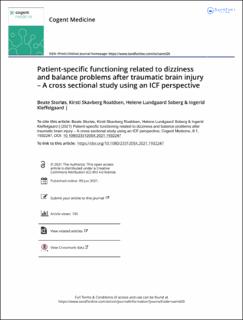| dc.contributor.author | Storløs, Beate | |
| dc.contributor.author | Roaldsen, Kirsti Skavberg | |
| dc.contributor.author | Søberg, Helene L. | |
| dc.contributor.author | Kleffelgård, Ingerid | |
| dc.date.accessioned | 2022-02-28T10:17:24Z | |
| dc.date.available | 2022-02-28T10:17:24Z | |
| dc.date.created | 2022-01-18T14:23:31Z | |
| dc.date.issued | 2021-06-09 | |
| dc.identifier.issn | 2331-205X | |
| dc.identifier.uri | https://hdl.handle.net/11250/2981644 | |
| dc.description.abstract | To describe patient-specific problems in functioning related to dizziness and balance problems in patients with mild to moderate traumatic brain injury (TBI) in a biopsychosocial context. A cross-sectional study where data from the Patient-Specific Functional Scale (PSFS) was linked to the International Classification of Functioning, Disability and Health (ICF). Data from 60 patients were classified into second-level ICF categories, using the ICF linking rules. The 60 patients included 73% women; mean age, 39 (SD 12.9) years with mild to moderate TBI (mean GCS 14.5, SD 1.3). The patients predominantly reported problems representing the activities and participation components of the ICF; mobility-related problems were most frequently reported by 42%. In addition, vestibulo-ocular and hearing problems, attention functions, domestic activities, recreation, leisure and environmental factors were frequently (≥10%) reported as barriers to functioning. The median severity of problems on the PSFS Numeric Rating Scale (0–10 worst to best) was 3 (IQR 1–5) points. The PSFS provided a unique set of problems in functioning most relevant to each patient resulting in a diversity of functional limitations. The patient-specific problems were all represented in the ICF, supporting a biopsychosocial perspective on problems related to dizziness and balance problems after TBI. | en_US |
| dc.language.iso | eng | en_US |
| dc.publisher | Cogent OA | en_US |
| dc.relation.ispartofseries | Cogent Medicine;Volume 8, 2021 - Issue 1 | |
| dc.rights | Navngivelse 4.0 Internasjonal | * |
| dc.rights.uri | http://creativecommons.org/licenses/by/4.0/deed.no | * |
| dc.subject | Traumatic brain injuries | en_US |
| dc.subject | Dizziness | en_US |
| dc.subject | Balance problems | en_US |
| dc.subject | Patient-specific functional scales | en_US |
| dc.subject | International disability classifications | en_US |
| dc.subject | Functioning | en_US |
| dc.subject | Health | en_US |
| dc.title | Patient-specific functioning related to dizziness and balance problems after traumatic brain injury – A cross sectional study using an ICF perspective | en_US |
| dc.type | Peer reviewed | en_US |
| dc.type | Journal article | en_US |
| dc.description.version | publishedVersion | en_US |
| dc.rights.holder | © 2021 The Author(s) | en_US |
| cristin.ispublished | true | |
| cristin.fulltext | original | |
| cristin.qualitycode | 1 | |
| dc.identifier.doi | https://doi.org/10.1080/2331205X.2021.1932247 | |
| dc.identifier.cristin | 1983700 | |
| dc.source.journal | Cogent Medicine | en_US |
| dc.source.volume | 8 | en_US |
| dc.source.issue | 1 | en_US |
| dc.source.pagenumber | 1-12 | en_US |

